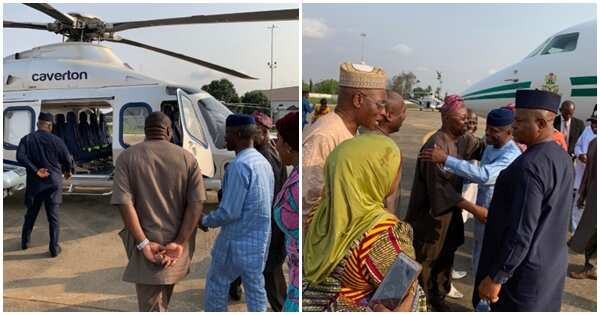The Caverton group has given Vice President Yemi Osinbajo another helicopter for elections campaign purposes.
The company in a tweet on Sunday, February 3, disclosed that the delivery of the chopper to the vice-president was in adherence to its commitment to uphold and professionalism.

Caverton group says its action was in adherence to its commitment to uphold and professionalism, photo credits: Twitter - Caverton
Source: UGC
"A true statement of our commitment to safety and professionalism the Vice President Professor Yemi Osinbajo continues his campaign flying with Caverton,” the statement said.
READ ALSO: Governor Wike accuses Buhari govt of marking 200 judges for intimidation, false allegations
Legit.ng had reported that what would have been a national disaster was averted on Saturday, February 2, 2019, as the chopper of Nigeria’s vice president, Yemi Osinbajo, crash-landed in Kabba, a town in Kogi state.
READ ALSO: NAIJ.com upgrades to Legit.ng: a letter from our Editor-in-Chief Bayo Olupohunda
Osinbajo's spokesperson, Laolu Aknade, confirmed the incident, but said the vice president was safe and that no casualties were recorded.
In a related report, Professor Yemi Osinbajo, has reacted after surviving a helicopter crash on his way to Kogi state in continuation of the campaign for the re-election of Muhammadu Buhari, the candidate of the All Progressives Congress (APC).
Osinbajo, who was aboard the helicopter with members of his team when the incident happened, told Nigerians that he was safe.
The vice president also commended the crew members who managed the situation and averted a major disaster that would have occurred.
Meanwhile, the management of Caverton helicopters has said unusual weather condition caused the helicopter conveying Vice President Yemi Osinbajo to crash in Kogi state on Saturday, February 2.
The company which owns the helicopter that crashed landed in Kogi in a statement on Saturday night, February 2, noted that the passengers and crew on-board the Augusta helicopter that crashed suffered no injuries. It said they were all safely evacuated.
The firm explained that it had informed the relevant authorities about the incident and that investigation into the crash had commenced.
NAIJ.com (naija.ng) -> Legit.ng. We have upgraded to serve you better.
What has changed in Nigeria since the last election? | Legit TV
Source: Legit.ng
from Nigeria News today & Breaking Naija news ▷ Read on Legit.ng 24/7 http://bit.ly/2S6sVGL
via EDUPEDIA24/7
Comments
Post a Comment